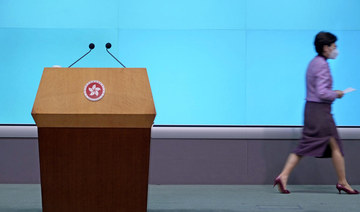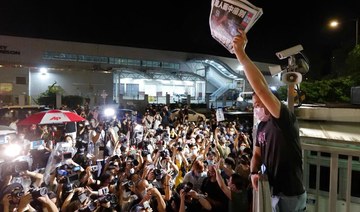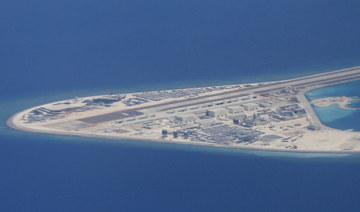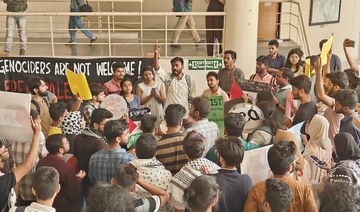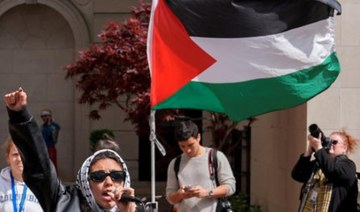LONDON/HONG KONG: The selection process for a new chief executive in Hong Kong is a source of grave concern and underscores wider worries about fundamental freedoms there, a Group of Seven statement said on Monday, prompting a rebuke from China.
Hong Kong’s leader-in-waiting, John Lee, was endorsed for the city’s top job on Sunday by a committee stacked with pro-Beijing loyalists, as the financial hub attempts to relaunch itself after several years of political upheaval.
Lee, the sole candidate, received the votes of 1,416 members of a pro-Beijing election committee, whose members have been vetted for their loyalty to the central government.
The rest of the city’s 7.4 million people had little say in choosing their leader, despite China’s promises to one day grant full democracy to the former British colony, which returned to Chinese rule in 1997.
“The current nomination process and resulting appointment are a stark departure from the aim of universal suffrage and further erode the ability of Hong Kongers to be legitimately represented,” a joint G7 statement published on the British government’s website said.
The Central Government’s Liaison Office in the city said in a statement on Tuesday G7’s “so-called statement” was “full of arrogance and bias,” adding the Hong Kong election process was legal and fair.
The Commissioner’s Office of China’s Foreign Ministry in Hong Kong said late on Monday it opposed G7’s “irresponsible remarks,” which smeared Hong Kong’s new electoral system and grossly interfered in China’s internal affairs.
It said Lee was elected by a high margin and the vote was a practice of “whole process democracy with Hong Kong characteristics.”
G7 flags rights concerns in selection of new Hong Kong leader
https://arab.news/g22z2
G7 flags rights concerns in selection of new Hong Kong leader
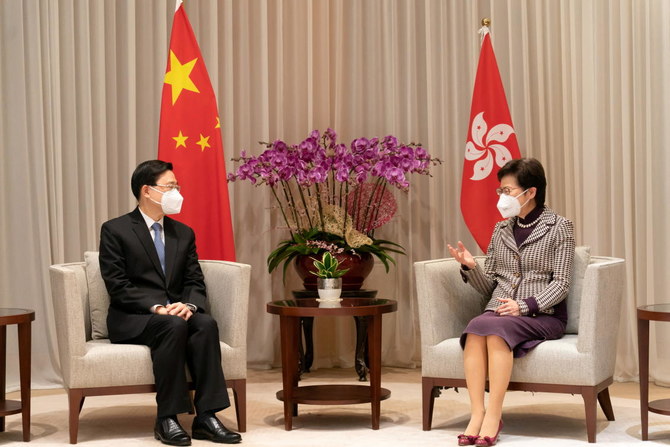
- Hong Kong’s leader-in-waiting, John Lee, was endorsed for the city’s top job on Sunday by a committee stacked with pro-Beijing loyalists
UK local polls could determine PM Sunak’s fate
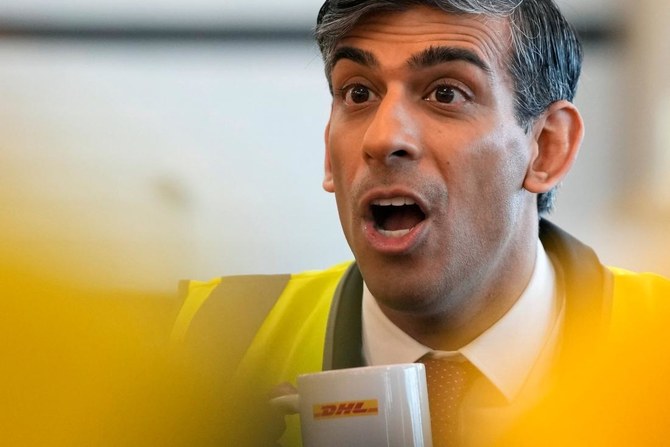
The polls are the last major electoral test before a general election that Sunak’s party, in power since 2010, seems destined to lose to the Labour opposition.
Sunak has said he wants to hold the nationwide vote in the second half of the year, but bruising defeats in Thursday’s votes could force his hand earlier.
“These elections form a vital examination for the Sunak premiership — road-testing its claim that the plan is working and the degree to which voters still lend that notion any degree of credibility,” political scientist Richard Carr told AFP.
Incumbent governments tend to suffer losses in local contests and the Conservatives are forecast by pollsters to lose about half of the council seats they are defending.
Sunak’s immediate political future is said to rest on whether two high-profile Tory regional mayors get re-elected in the West Midlands and Tees Valley areas of central and northeast England.
Wins for the Conservative mayors, Andy Street and Ben Houchen, would boost hopes among Tory MPs that Sunak can turn around their party’s fortunes in time for the general election.
But speculation is rife in the UK parliament that a bad showing could lead some restive Conservative lawmakers to try to replace Sunak before the nationwide poll.
“If Andy Street and Ben Houchen both lose, any idea that Sunak can carry on is surely done,” said Carr, a politics lecturer at Anglia Ruskin University.
“Whether that means he rolls the dice on a general election or gets toppled remains to be seen.”
Factional infighting has plagued the Tories in recent years, serving up five prime ministers since the 2016 Brexit vote, including three in four months from July to October 2022.
A group of restive Conservative MPs have drawn up a “policy blitz” for a potential successor to Sunak in the event of massive losses this week, British media have reported.
Some observers say it would be madness for the Conservatives to topple another leader when Sunak has provided some stability since succeeding Liz Truss in October 2022.
Others say the party’s credibility is already shot so why not try one last desperate throw of the dice to try to stop a predicted Labour landslide.
Some 52 MPs would need to submit letters of no confidence in Sunak to trigger an internal party vote to replace him — a tall ask.
“I still expect Sunak will lead the Conservatives into the general election,” Richard Hayton, a politics professor at Leeds University, told AFP.
“But some MPs may seek to move against him, which will further damage his standing with the general public.”
Sunak, 43, was an internal Tory appointment following Truss’s disastrous 49 days premiership in which her unfunded tax cuts caused market turmoil and sank the pound.
Despite numerous leadership resets under Sunak, the Tories have continued to trail Labour, led by Keir Starmer, by double digits in most opinion polls.
An Ipsos poll earlier this month put Sunak’s satisfaction rating at a joint all-time low of minus 59 percent.
More than 2,500 councillors are standing in England on Thursday, as well as London’s Labour mayor Sadiq Khan who is seeking a record third term in office.
Most of the council seats up for re-election were last contested in 2021, when ex-Tory premier Boris Johnson was popular as he rolled out Covid-19 vaccines.
UN Human Rights Chief troubled by ‘heavy-handed’ action against protesters at US colleges
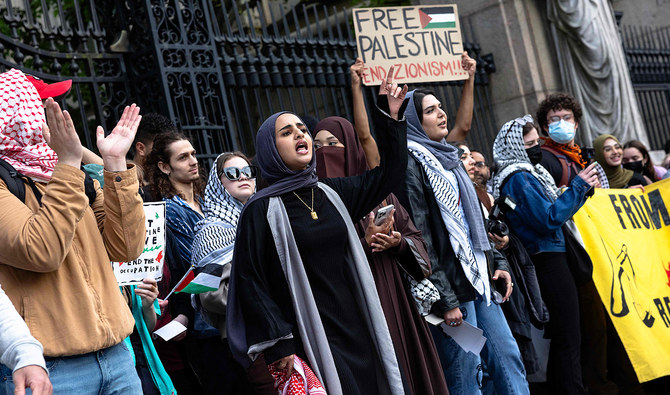
- Volker Turk says ‘freedom of expression and the right to peaceful assembly are fundamental to society, particularly when there is sharp disagreement on major issues’
- Protests have taken place on campuses in several states as students demand colleges withdraw investments from businesses involved in Israel’s assault on Gaza
NEW YORK CITY: The UN’s high commissioner for human rights on Tuesday said he is troubled by “a series of heavy-handed steps” taken by education authorities and law enforcement officials to break up protests at college campuses in the US.
Volker Turk said: “freedom of expression and the right to peaceful assembly are fundamental to society, particularly when there is sharp disagreement on major issues, as there are in relation to the conflict in the Occupied Palestinian Territory and Israel.”
Pro-Palestinian demonstrations have spread across college campuses in Texas, New York, Atlanta, Utah, Virginia, New Jersey, California and other parts of the US as students protest against the death toll during the war in Gaza, call for a ceasefire and demand authorities at their colleges withdraw investments from businesses involved in Israel’s military assault on Gaza.
Though largely peaceful, at some locations the protests have been dispersed or dismantled by security forces. Hundreds of students and teachers have been arrested, some of whom face charges or academic sanctions.
Turk expressed concern that some of the responses by law enforcement authorities at several colleges might have been disproportionate, and called for such actions to be scrutinized to ensure they do not exceed what is necessary “to protect the rights and freedoms of others.”
He added that all such actions must be guided by human rights law, while “allowing vibrant debate and protecting safe spaces for all.”
He reiterated that antisemitic, anti-Arab and anti-Palestinian activities and speech are “totally unacceptable, deeply disturbing (and) reprehensible.” However, the conduct of protesters must be assessed and addressed individually rather than through “sweeping measures that impute to all members of a protest the unacceptable viewpoints of a few,” Turk added.
“Incitement to violence or hatred on grounds of identity or viewpoints, whether real or assumed, must be strongly repudiated. We have already seen such dangerous rhetoric can quickly lead to real violence.”
Philippines says Chinese coast guard elevating tensions in South China Sea

- Philippine officials have said a coast guard ship and a fisheries vessel were damaged when Chinese coast guard vessels fired water cannons at them
- No country has sovereignty over Scarborough Shoal, a prime fishing patch close to major shipping lanes that is used by several countries
MANILA: The Philippines on Wednesday accused China’s coast guard of elevating tensions in the South China Sea after two vessels suffered damage from water cannon use by Beijing, an official said.
Philippine officials have said a coast guard ship and a fisheries vessel were damaged when Chinese coast guard vessels fired water cannons at them while on their way to the disputed Scarborough shoal on Tuesday to help Filipino fishermen at sea.
Commodore Jay Tarriela, Philippine coast guard spokesperson on South China Sea matters, said their Chinese counterparts have elevated tensions after it directly used water cannon against one of its vessels for the first time.
“It just goes to show that Goliath is becoming more Goliath. They don’t hesitate to use brute force to violate international law,” Tarriela told a briefing.
China has previously used water cannons against Philippine navy-crewed civilian supply vessels in the region.
No country has sovereignty over Scarborough Shoal, a prime fishing patch close to major shipping lanes that is used by several countries. The shoal falls inside the Philippines’ exclusive economic zone (EEZ) and has been a constant source of flashpoint between it and China.
Tarriela added China’s actions do not count as an armed attack against a Philippine vessel, but he said China has been raising the pressure of its water cannons which have damaged their ships.
The Philippines has a longstanding mutual defense treaty with the United States and Washington has pledged its “ironclad commitment” to defending its ally against an armed attack on Filipino military and public vessels, including coast guard ships, anywhere in the South China Sea.
A spokesperson at China’s embassy in Manila said Scarborough shoal, which it calls Huangyan Dao, “has always been China’s territory” and urged the Philippines to “stop making infringement and provocations at once and not to challenge China’s resolve to defend our sovereignty.”
China claims sovereignty over much of the South China Sea, a conduit for more than $3 trillion of annual ship-borne commerce, including parts claimed by the Philippines, Vietnam, Indonesia, Malaysia and Brunei.
An international tribunal in 2016 said China’s expansive claim had no legal basis, a decision Beijing has rejected.
Police arrest Columbia students, clear occupied building in campus unrest
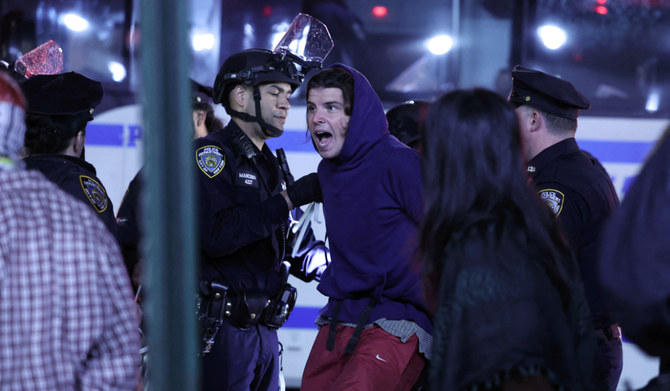
- Israel has killed more than 34,000 Palestinians, according to Gaza’s Health Ministry
- The protests have posed a challenge to university administrators trying to balance free speech rights with complaints that the rallies have veered into anti-Semitism and hate
New York, May 1, 2024 Agence France Presse: Dozens of helmeted police flooded Columbia University’s campus in the heart of New York City on Tuesday to evict a building occupied by pro-Palestinian student protesters and detain demonstrators.
Police climbed into Hamilton Hall via a second floor window they reached from a laddered truck, before leading handcuffed students out of the building into police vans.
The hall had been occupied at dawn by demonstrators who vowed they would fight any eviction, as they protested the soaring death toll from Israel’s war with Hamas in the Gaza Strip.
The action came as university administrators around the United States have struggled for weeks to contain pro-Palestinian demonstrations on dozens of campuses.
In a letter addressed to the New York Police department, Columbia University president Minouche Shafik said that the occupation of the school building was being led by “individuals who are not affiliated with the University” and asked “NYPD’s help to clear all individuals from Hamilton Hall and all campus encampments.”
She also asked the police to remain on campus through at least May 17, “to ensure encampments are not reestablished.”
Writing on Instagram, the protests slammed Shafik’s statement, saying “her use of the words ‘care’ and ‘safety’ are nothing short of horrifying.”
The weeks of demonstrations — the most sweeping and prolonged unrest to rock US college campuses since the Vietnam war protests of the 1960s and 70s — have already led to several hundred arrests of students and other activists.
Many of them have vowed to maintain their actions despite suspensions and threats of expulsion.
Earlier, protesters at Columbia were seen using ropes to hoist crates of supplies up to the building’s second floor, apparently signaling the students had planned to hunker down.
President Joe Biden’s White House had sharply criticized the seizure of Hamilton Hall, with a spokesman saying it was “absolutely the wrong approach.”
“That is not an example of peaceful protest,” the spokesman added.
The protests, with Columbia at their epicenter, have posed a challenge to university administrators trying to balance free speech rights with complaints that the rallies have veered into anti-Semitism and hate.
The unrest has swept through US higher education institutions like wildfire, with many student protesters erecting tent encampments on campuses from coast to coast.
At Columbia, demonstrators have vowed to remain until their demands are met, including that the school divest all financial holdings linked to Israel.
The university has rejected the demand. Columbia has warned that students occupying the building face expulsion.
In one of the newest clashes, at the University of North Carolina at Chapel Hill, police moved in Tuesday to clear one encampment, detaining some protesters in a tense showdown.
Meanwhile at northern California’s Cal Poly Humboldt, a week-long occupation was brought to a dramatic end early Tuesday when police moved in to arrest nearly three dozen protesters who had seized buildings and forced the closure of the campus.
In Oregon, Portland State University’s campus was closed Tuesday “due to an ongoing incident” in the library, college authorities said, after local media reported around 50 protesters had broken into the building a day earlier.
And Brown University reached an agreement in which student protesters will remove their encampment in exchange for the institution holding a vote on divesting from Israel — a major concession from an elite American university during the protests.
Footage of police in riot gear summoned at various colleges has been viewed around the world.
UN human rights chief Volker Turk voiced concern at the heavy-handed steps taken to disperse the campus protests, saying “freedom of expression and the right to peaceful assembly are fundamental to society.”
He added that “incitement to violence or hatred on grounds of identity or viewpoints — whether real or assumed — must be strongly repudiated.”
Shafik said many Jewish students had fled Columbia’s campus in fear. “Anti-Semitic language and actions are unacceptable,” she said.
The Gaza war started when Hamas militants staged an unprecedented attack on Israel on October 7 that left around 1,170 people dead, mostly civilians, according to an AFP tally of Israeli official figures.
During their attack, militants also seized hostages, 129 of whom Israel estimates remain in Gaza, including 34 whom the military says are dead.
Israel’s retaliatory offensive has killed at least 34,535 people in Gaza, mostly women and children, according to the Hamas-run territory’s health ministry.
House Republicans launch investigation into federal funding for universities amid campus protests
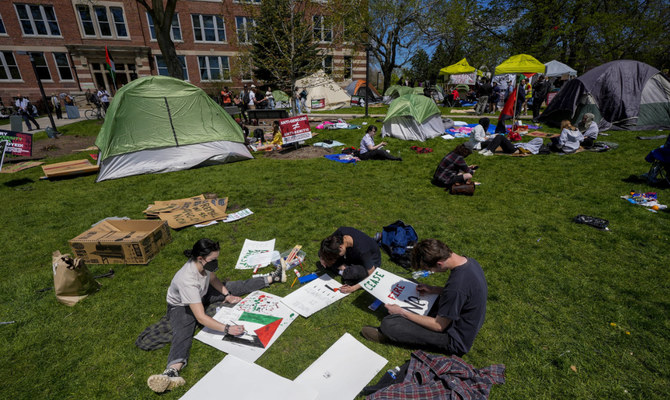
- Nationwide, campus protesters have called for their institutions to cut financial ties to Israel
WASHINGTON: House Republicans on Tuesday announced an investigation into the federal funding for universities where students have protested the Israel-Hamas war, broadening a campaign that has placed heavy scrutiny on how presidents at the nation’s most prestigious colleges have dealt with reports of antisemitism on campus.
Several House committees will be tasked with a wide probe that ultimately threatens to withhold federal research grants and other government support to the universities, placing another pressure point on campus administrators who are struggling to manage pro-Palestinian encampments, allegations of discrimination against Jewish students and questions of how they are integrating free speech and campus safety.
The House investigation follows several recent high-profile hearings that precipitated the resignations of presidents at Harvard and the University of Pennsylvania. And House Republicans promised more scrutiny, saying they were calling on the administrators of Yale, UCLA and the University of Michigan to testify next month.
“We will not allow antisemitism to thrive on campus, and we will hold these universities accountable for their failure to protect Jewish students on campus,” said House Speaker Mike Johnson at a news conference.
Nationwide, campus protesters have called for their institutions to cut financial ties to Israel and decried how thousands of civilians in Gaza have been killed by Israel following the deadly attack by Hamas on Oct. 7.
Some organizers have called for Hamas to violently seize Israeli territory and derided Zionism. Jewish students, meanwhile, have reported being targeted and say campus administrators have not done enough to protect them.
After Johnson visited Columbia last week with several other top House Republicans, he said “the anti-Jewish hatred was appalling.”
Republicans are also turning to the issue at a time when election season is fully underway and leadership needs a cause that unites them and divides Democrats. The House GOP’s impeachment inquiry into President Joe Biden has fallen flat and the Republican conference is smarting after a series of important bills left GOP lawmakers deeply divided. Democrats have feuded internally at times over the Israel-Hamas war and how campus administrators have handled the protests.
Senate Majority Leader Chuck Schumer, a New York Democrat, said in a floor speech Tuesday that it was “unacceptable when Jewish students are targeted for being Jewish, when protests exhibit verbal abuse, systemic intimidation, or glorification of the murderous and hateful Hamas or the violence of October 7th.”
Rep. Pete Aguilar, the No. 3 House Democrat, at a news conference Tuesday said that it was important for colleges “to ensure that everybody has an ability to protest and to make their voice heard but they have a responsibility to honor the safety of individuals.”
“For many of Jewish descent, they do not feel safe, and that is a real issue,” he said, but added that he wanted to allow university administrators to act before Congress stepped in.
But the Republican speaker promised to use “all the tools available” to push the universities. Johnson was joined by chairs for six committees with jurisdiction over a wide range of government programs, including National Science Foundation grants, health research grants, visas for international students and the tax code for nonprofit universities.
Without Democratic support in the divided Congress, it is not clear what legislative punishments House Republicans could actually implement. Any bills from the House would be unlikely to advance in the Democratic-controlled Senate.
But so far, the House hearings with university presidents have produced viral moments and given Republicans high-profile opportunities to denounce campuses as hotbeds of antisemitism. In December, the presidents of Ivy League universities struggled to answer pointed questions about whether “calling for the genocide of Jews” would violate each university’s code of conduct.
Rep. Elize Stefanik, the New York Republican who posed the question in the December hearing, said it became the highest-viewed congressional hearing in history. She also cast the campaign against antisemitism as part of a broader conservative push against what they say is overt liberal bias at elite American universities.
“Enough is enough,” she said. “It is time to restore law and order, academic integrity and moral decency to America’s higher education institutions.”
The House Committee on Education and the Workforce is also requesting that the administrators of Yale, UCLA and the University of Michigan appear at a hearing on May 23 that focuses on how they handled the recent protests.
“As Republican leaders, we have a clear message for mealy-mouthed, spineless leaders: Congress will not tolerate your dereliction of duty to your Jewish students,” said the committee chair, North Carolina Rep. Virginia Foxx.
At a hearing of the committee earlier this month, Columbia University’s president took a firm stance against antisemitism. But at the same time, a protest was underway on Columbia’s campus that would soon set off others like it nationwide. The university began suspending students this week in an attempt to clear the protest encampment on campus.
The university is also facing federal legal complaints. A class-action lawsuit on behalf of Jewish students alleges Columbia breached its contract by failing to maintain a safe learning environment.
Meanwhile, a legal group representing pro-Palestinian students is urging the US Department of Education’s civil rights office to investigate whether Columbia’s treatment of the protesting students violated the Civil Rights Act of 1964.
Senate Republican Leader Mitch McConnell called on university administrators to “take charge.”
“On campus, protect Jewish community members. Clear the encampments. Let students go to class and take their exams. And allow graduations to proceed,” he said.



